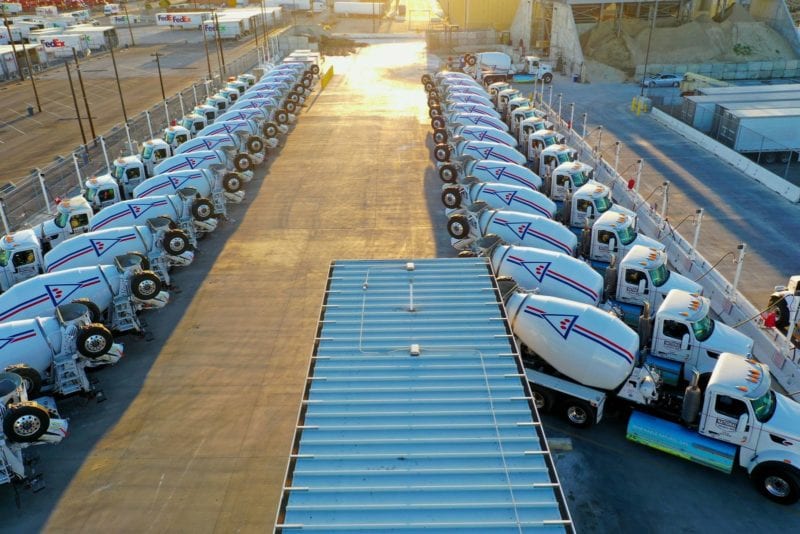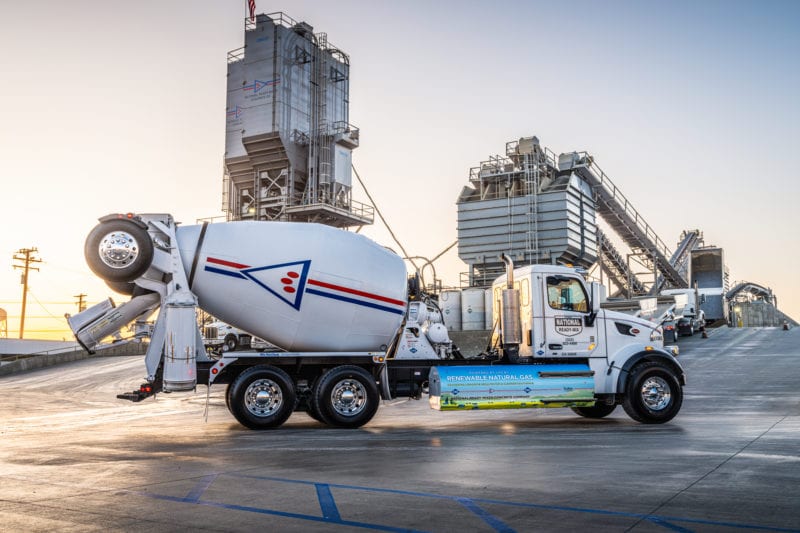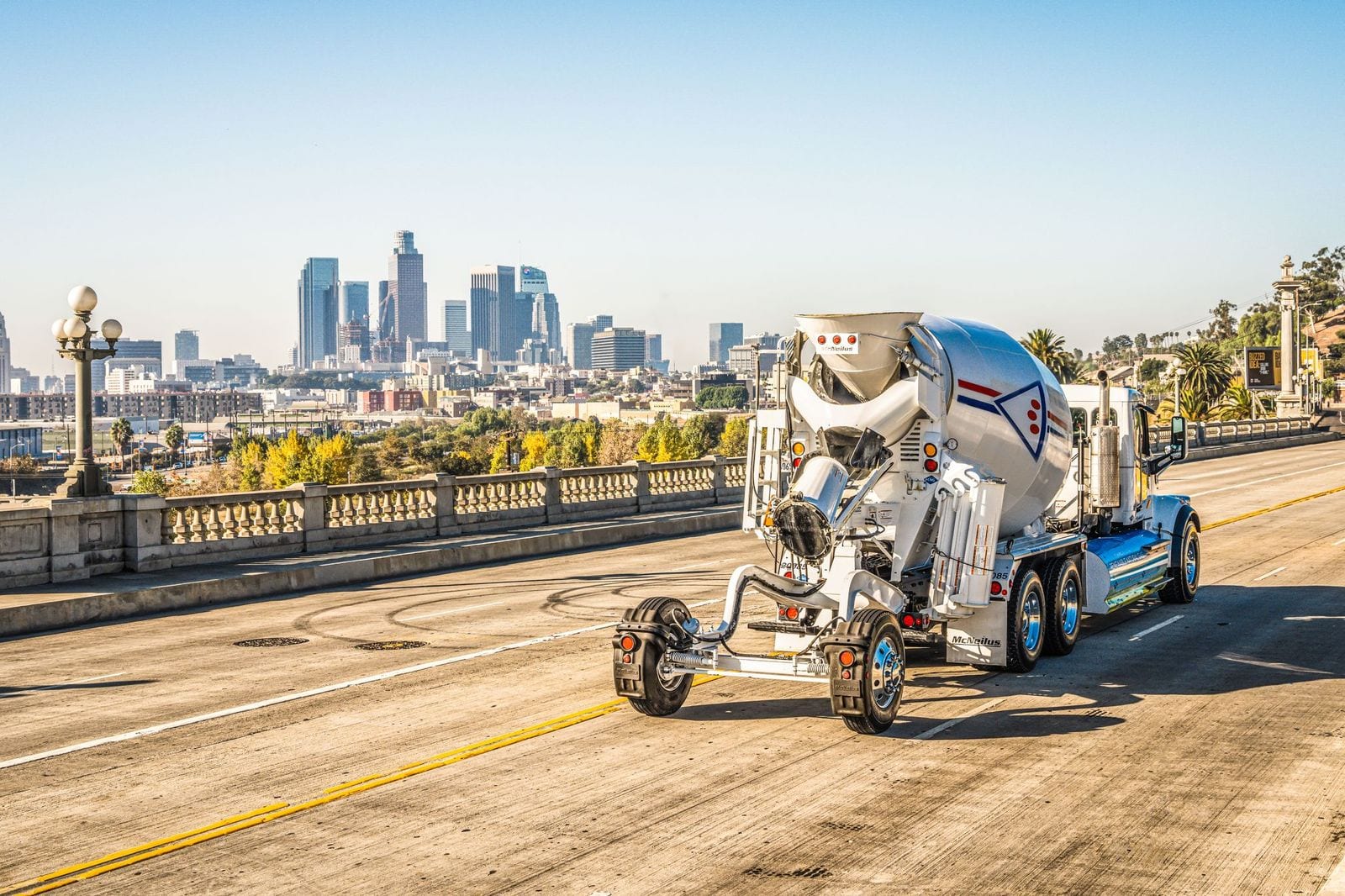National Ready Mixed Concrete Company (NRMCC), a member of the California Natural Gas Vehicle Partnership (CNGVP), has deployed another 24 near-zero emission compressed natural gas (CNG) concrete mixers from Peterbilt, expanding its Southern California CNG fleet to 117 trucks. NRMCC’s CNG fleet is fueled with 100% carbon-negative renewable natural gas (RNG) produced in California, enabling the company to go beyond carbon neutrality and make a beneficial impact on climate protection and regional air quality.
“There is no other low- or zero-emission technology available today that could enable a heavy-duty fleet like ours…to offset the level of greenhouse gas (GHG) emissions reductions that we’ve achieved.” -Steve Lode, President of NRMCC
NRMCC, part of the Vicat Group of Companies, is a large, privately owned concrete supplier that operates 11 plants in Los Angeles, Orange County and Ventura County. To help fulfill a company-wide commitment to reducing the carbon footprint of its operations, NRMCC began converting its heavy-duty fleet of mixers and haulers to near-zero natural gas trucks in June 2020. NRMCC’s fleet of concrete mixers, cement and material haulers travel throughout Southern and Central California, relying on Cummins Westport’s natural gas engines for the power and range needed to transport weighty payloads.

“In the past year alone, NRMCC has driven nearly 5 million miles with our CNG fleet fueled by RNG,” says Steve Lode, President of National. “There is no other low- or zero-emission technology available today that could enable a heavy-duty fleet like ours—running routes from Southern to Central California pulling heavy loads of cement—to offset the level of greenhouse gas (GHG) emissions reductions that we’ve achieved.”
Annually, NRMCC’s fleet will consume more than 1.2 million DGE of RNG, fueled in part at its private natural gas station built at its Vernon plant. The RNG, sourced from dairy digesters, has a carbon intensity score of negative 200, enabling the company to reduce its CO2 emissions by more than 42,000 metric tons each year—the GHG equivalent of removing 9,100 passenger vehicles from the road each year or creating electricity for 7,600 homes. Three additional private stations are scheduled to be installed by the end of 2021 at its Irwindale, Glendale and Santa Clarita locations which will consume dairy RNG as well.
NRMCC’s fleet will consume more than 1.2 million DGE of RNG…enabling the company to reduce its CO2 emissions by more than 42,000 metric tons each year—the GHG equivalent of removing 9,100 passenger vehicles from the road each year.
“NRMCC presents another example of how RNG fueled near zero emission trucks can deliver crucial GHG, CO2, and criteria pollutant emission reductions today,” said Tom Swenson, vice-chair of the California Natural Gas Vehicle Partnership and business development manager for Cummins Inc. “Real and immediate environmental impacts can be made when companies such as NRMCC commit to investing in clean fuel and technology options.”
In 2020, data from the California Air Resources Board’s (CARB) Low Carbon Fuel Standard (LCFS) program revealed that the average annual carbon intensity of compressed natural gas from renewable feedstocks (“bio-CNG”) was –6.82 gCO2e/MJ, the lowest average of any currently available vehicle fuel—including renewable electricity. This means that California fleet vehicles fueled by RNG are helping to remove carbon dioxide from the atmosphere and ultimately reduce the climate impact of the transportation sector.

Image: NRMCC
“Near-zero emission natural gas trucks are readily available technology that can reduce nitrogen oxide emissions by more than 90%,” said Wayne Nastri, South Coast Air Quality Management District (AQMD) executive officer. “NRMCC’s ability to increase its natural gas fleets is providing immediate air quality benefits to nearby communities.”
NRMCC’s investment in sustainable transportation was supported by a $15.7 million grant administered by the South Coast AQMD through the Carl Moyer Memorial Air Quality Standards Attainment Program and Proposition 1B Goods Movement Emission Reduction programs. The heavy-duty vehicle funding programs are a key part of California’s strategy to achieve clean air.
To learn about the benefits of near-zero natural gas vehicles and renewable natural gas, visit www.cngvp.org


